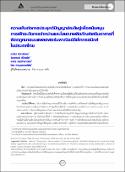บทคัดย่อ
ที่มา: ความนิยมใช้แพลตฟอร์มพาณิชย์อิเล็กทรอนิกส์ที่เพิ่มขึ้นอย่างรวดเร็วทำให้การจำหน่ายและโฆษณาผลิตภัณฑ์เสริมอาหารอย่างผิดกฎหมายทำได้ง่ายขึ้น วัตถุประสงค์: งานวิจัยนี้มีวัตถุประสงค์เพื่อศึกษาความเห็นของผู้มีส่วนได้ส่วนเสียหลักต่อการประยุกต์ปัญญาประดิษฐ์มาสนับสนุนการเฝ้าระวังการจำหน่ายและโฆษณาผลิตภัณฑ์สุขภาพที่ผิดกฎหมายบนแพลตฟอร์มพาณิชย์อิเล็กทรอนิกส์ในประเทศไทย ระเบียบวิธีศึกษา: เป็นการวิจัยเชิงคุณภาพโดยใช้วิธีการสัมภาษณ์เชิงลึกแบบกึ่งโครงสร้าง ผู้ให้ข้อมูลสำคัญประกอบด้วย ตัวแทนองค์กรภาครัฐ องค์กรอิสระ องค์กรผู้บริโภค ผู้ให้บริการแพลตฟอร์ม และนักวิชาการ รวมจำนวน 8 คน จาก 8 องค์กร และทำการวิเคราะห์ข้อมูลโดยการวิเคราะห์แก่นสาระเพื่อให้ได้ประเด็นสำคัญ ผลการศึกษา: ผู้มีส่วนได้ส่วนเสียเห็นว่า ปัจจัยที่จะสนับสนุนให้นำปัญญาประดิษฐ์มาใช้เฝ้าระวังได้จริง ได้แก่ คุณลักษณะของนวัตกรรม เงื่อนไขของพื้นที่ การมีพันธมิตรสนับสนุน การสนับสนุนทางการเงิน และความต้องการใช้งานของผู้มีส่วนได้ส่วนเสีย ในขณะที่อุปสรรค ได้แก่ การปรับเข้ากับการทำงานจริง ความซับซ้อนของนวัตกรรม ต้นทุน กฎหมาย และนโยบาย และโครงสร้างพื้นฐานที่มีอยู่เดิม โดยมีความคาดหวังว่า ผู้ให้บริการแพลตฟอร์มพาณิชย์อิเล็กทรอนิกส์จะนำนวัตกรรมนี้ไปใช้งาน สรุป: การประยุกต์ปัญญาประดิษฐ์มาใช้เฝ้าระวังการจำหน่ายผลิตภัณฑ์เสริมอาหารบนแพลตฟอร์มพาณิชย์อิเล็กทรอนิกส์ มีทั้งปัจจัยสนับสนุนและปัจจัยที่เป็นอุปสรรคที่ต้องบริหารจัดการ และควรพัฒนาตัวแบบที่สอดคล้องกับความต้องการของกลุ่มเป้าหมายให้ได้เห็นคุณค่าของการนำไปใช้ โดยมิใช่การอาศัยเฉพาะการบังคับใช้กฎหมายเท่านั้น
บทคัดย่อ
Background: The rapid growth of e-commerce platforms has facilitated the illegal sale and
advertising of dietary supplements that poses risks to consumers.
Objectives: This study explored key stakeholders’ perspectives on using artificial intelligence (AI)
tools to monitor the illegal sale and advertising of dietary supplements on e-commerce platforms in
Thailand.
Methods: A qualitative study using semi-structured in-depth interviews was conducted with
representatives from eight organizations, including government authorities, non-governmental organizations, consumer advocacy groups, e-commerce platform providers, and academia. Thematic analysis was
employed to identify key themes.
Results: Stakeholders identified several factors that could facilitate the successful implementation
of AI-powered monitoring systems, such as: the innovative advantages offered by AI technology, alignment
with the local context, supportive partnerships, financial support, and a clear need for such a system
among stakeholders. Conversely, barriers to adoption included the need to adapt AI to real-world
operational contexts, the complexity of the technology, associated costs, relevant policies and laws, and
existing infrastructure limitations. E-commerce providers were identified as the primary target users for
this technology.
Conclusions: AI for monitoring the sales and advertising of dietary supplements on e-commerce
platforms is likely to grasp opportunities and to face challenges that need careful implementation. It is
important to develop effective AI models that align with stakeholders’ needs and deliver values to
encourage adoption, rather than relying solely on regulatory enforcement.


